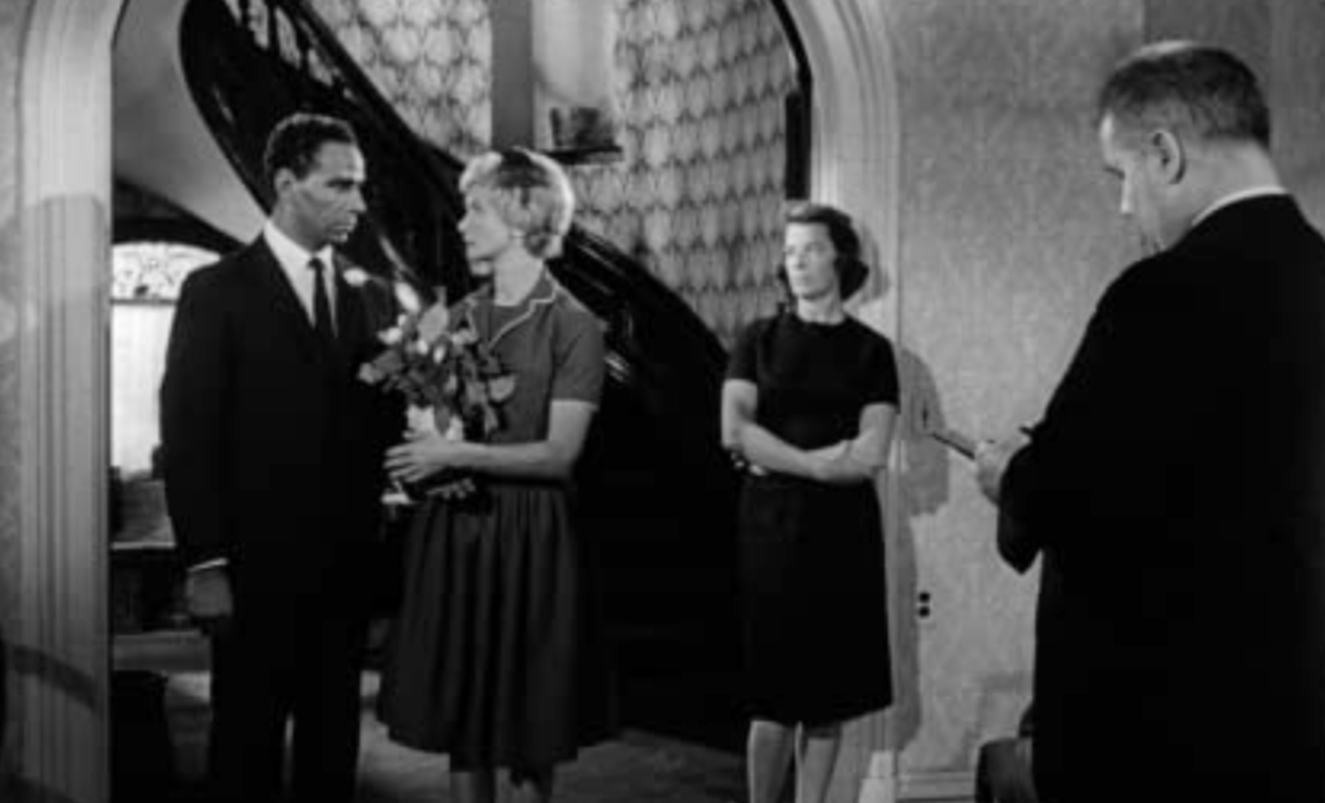
- Film
- MLK Day
‘One Potato, Two Potato’ (1964): Larry Peerce’s Seminal Indie Drama of Interracial Marriage
Larry Peerce directed One Potato, Two Potato (1964), a pioneering indie drama about interracial marriage and its devastating effects on all concerned, especially the young white daughter caught up in a messy situation.
The film preceded by three years the more famous Guess Who’s Coming to Dinner Stanley Kramer’s Golden Globe nominee (and Oscar winner) starred Katharine Hepburn, Spencer Tracy, Sidney Poitier and Katharine Houghton.
The One Potato script, written by Orville H. Hampton and Raphael Hayes, was nominated for the original screenplay Oscar but did not win; the award that year went to the Cary Grant comedy, Father Goose.
Barbara Barrie plays Julie Cullen, a young white divorced woman. She has been on her own for four years since her husband (played by Richard Mulligan) abandoned her and their daughter Ellen, who was only aged 1 at the time. At work, Julie meets Frank Richards (Bernie Hamilton) who is Black and the two strike up a friendship which soon blossoms into romantic love.
The text does not shy away from depicting obstacles to the interracial bond within the white as well as the Black communities.
Their relationship is strained by the racial prejudices of many around them, including Frank’s parents, William and Martha, who oppose the pairing. But ultimately, Frank and Julie persevere. Later, they get married, leading to Julie and Ellen (Marti Mericka) moving in with Frank and his parents. Ellen’s arrival immediately softens Martha’s heart, but William remains cool toward Julie, steadfast in his belief that Frank and Julie’s marriage is a foolish endeavor.
His attitude changes only when Frank and Julie have a son. When William first holds his new grandson, he loses any remaining animosity, and the household becomes a happy one for all.
Eventually, Julie’s ex-husband Joe returns, seeking to establish a visitation relationship with Ellen. However, upon realizing that Julie’s and Ellen’s new family is Black, he is appalled. Finding the situation unacceptable — though never explaining why — he petitions the court for legal custody of Ellen.
Frank’s lawyer tells him Joe is likely to win. Agreeing with the lawyer’s analysis, William advises Frank to take Julie and the children and flee the state. Frank, however, decides to stay and fight the case in court.
When Julie appeals to Joe directly, it further angers him and, losing control, he attempts to force himself on Julie physically. When Frank learns what has happened, he is intensely frustrated by his inability to defend his wife by confronting Joe. Reflecting on the zeitgeist, he’s fully aware that if he does, it would be the end of whatever chance he and Julie have of winning the custody case.
Judge Powell (Harry Bellaver) looks carefully into Ellen’s family situation, including interviewing her. She affirms how much she loves Frank, and she seems oblivious to the racial issues at play.
When the judge asks young Ellen about her baby brother being “different” from her, her only thought is that he is a boy, while she is a girl. The judge recognizes that the family situation in the Richards home is superior for Ellen in every way except for the fact that she is white, growing up in a Black household. While the judge does not condone racial prejudices and agrees that they should be fought, he, too, cannot ignore their existence. He claims that if Ellen remains with Frank and Julie, it will negatively impact her when she reaches adulthood, though he cannot articulate the reason. Siding with the status quo, he grants Joe’s petition for custody.
The film’s last sequence, while realistic, is emotionally heartbreaking, almost unbearable to watch. When Joe arrives to pick up Ellen, she is excited, initially under the impression that her father is taking her for a short visit from which she will soon return.
When she finally realizes that she’s being sent to live with him permanently and that her brother is left behind, she assumes that she is being punished for having misbehaved in some way. Joe loads Ellen and her clothes into a taxi as the family looks on in sorrow. As the taxi drives away with Joe and Ellen in the back seat, she helplessly presses her face against the car’s rear window, shouting back to her mother, pleading her to be allowed to stay, and promising that she will be a “good” girl is she takes her back.
The low-budget, black-and-white One Potato, Two Potato was shot in and around the small city of Painesville in northeastern Ohio.
For her performance, Barrie won the best actress award at the 1964 Cannes Film Festival, in a tie with Anne Bancroft for The Pumpkin Eater.
In 1989, Richard Mulligan (brother of the well-known producer and director Robert Mulligan) won the Golden Globe Award Best Lead Actor in a Comedy Series for portraying Dr. Harry Weston in Empty Nest, a popular series that ran from 1988 to 1995.
Even as late as 1967, three years after America passed its Civil Rights Act, the central interracial couple in Guess Who’s Coming to Dinner, a mainstream studio picture, were not “allowed” to be shown kissing on the mouth — fearing the reaction of conservative viewers and the strictures of the Production Code (though already in decline).
Once again, American independent cinema of the 1960s and 1970s proved its undeniable boldness and power in tackling controversial issues, such as interracial bonds, abortion, and other civil and human rights.